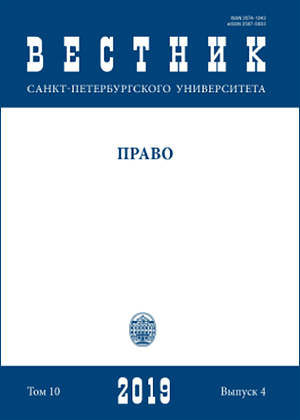Analysis of judicial cooperation in practical terms between the People's Republic of China and the Republic of Uzbekistan
DOI:
https://doi.org/10.21638/spbu14.2019.408Abstract
Cooperation in legal services between countries is an important guarantee for cooperation in other fields. Since the “one belt and one way” strategy was put forward, China and Uzbekistan have strengthened cooperation in the field of politics, economy and trade, humanities and other fields, but cooperation in legal services remains at a preliminary stage. Strengthening cooperation in legal services between the two countries is an inevitable requirement to further expand economic and trade cooperation between the two countries. It is also a major boost to enhance the functions of the SCO and promote the establishment of the SCO Legal Services Committee. At present, the cooperation of legal services between the two countries is primarily involved with two problems: one is that the legal level of the two countries is different, which makes it difficult to achieve mutual recognition; the other is that there are language and cultural barriers between the two countries, and there is a lack of qualified specialists-lawyers who can understand the laws and languages of the two countries. In this regard, the two countries should strengthen the theoretical study of investment laws and regulations, improve the instruments to resolve disputes on the basis of the original investment protection agreements, jointly train specialists with both language and law skills, and strive to create a complete legal service system including a legal center for the protection of legitimate rights and interests of foreign-funded enterprises, a database of investment laws and regulations, legal service technical support and legal service personnel training.
Keywords:
China — Uzbekistan, cooperation in the legal sphere, legal service system
Downloads
References
Downloads
Published
How to Cite
Issue
Section
License
Articles of "Vestnik of Saint Petersburg University. Law" are open access distributed under the terms of the License Agreement with Saint Petersburg State University, which permits to the authors unrestricted distribution and self-archiving free of charge.







